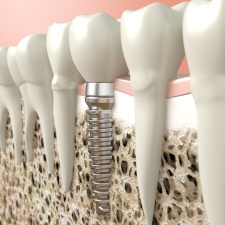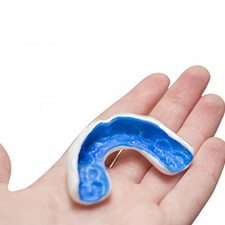Dental Implants – Waco, TX
A Nearly Perfect Replica of Your Real Teeth

Losing even a single tooth can cause devastating consequences for your confidence, oral health, and even your quality of life. Thankfully, you don’t need to live with the long-term results of an incomplete smile. Dental implants in Waco are a nearly perfect replica of your real teeth, allowing you to enjoy the next best thing to what nature gave you. Here at Dental Station, Dr. Wendy Winarick can develop a custom treatment plan with dental implants to help you enjoy having a full smile again. Give us a call today to learn more!
Why Choose Dental Station Family Dentistry for Dental Implants?
- Entire Procedure Completed In-Office
- Low-to-No-Interest Financing Offered
- Treatments Individualized for Each Patient
What Are Dental Implants?

Dental implants have a unique three-part structure that allows them to replace every portion of missing teeth. The implant itself, meant to mimic the tooth’s root, is a thin metal post that is surgically placed into the jaw. There, it becomes one with the jawbone in a process called osseointegration. Once the implants and bone have fused, a metal connector piece called an abutment is placed. This allows our team to secure a custom-made crown, bridge, or denture on top.
The 4-Step Dental Implant Process

Dental implants are the best tooth replacement option out there. Because of their unique ability to replace the roots of missing teeth, they allow for all sorts of benefits that you can’t experience with dental bridges and traditional dentures. To achieve this, dental implants require a multistep process that takes place over several months. Everyone’s treatment looks a little bit different, but here are the four main steps everyone can expect.
Initial Dental Implant Consultation

The first phase is your consultation, during which Dr. Winarick examines your mouth to ensure that you are a good candidate for dental implants. Some patients end up needing preliminary procedures, like bone grafting or gum disease treatment before they can move forward with the implant process. If any of these apply to you, we’d be happy to help you get them scheduled. Once your gums and jaw are in excellent shape, we will move on to planning the rest of your treatment.
Dental Implant Surgery

Next, the implants need to be surgically embedded in your jaw. Instead of sending you to a trusted specialist, Dr. Winarick will be able to handle the entire surgical portion of the procedure in our office. She will first take detailed X-rays of your mouth to accurately plan the placement of your implants. Each one will be strategically positioned to take the best advantage of bone density, allowing for added strength and durability.
Dental Implant Osseointegration & Abutment

After your implant is surgically positioned in your jawbone, several months of healing are required. During this time, osseointegration occurs. The implant and surrounding bone tissue bond together, similarly to the connection that once existed between your tooth root and the bone. Then, you will need to undergo another minor procedure where abutments are attached to the ends of the implants. Impressions are taken so your custom restorations can be made at the dental lab.
Delivery of Dental Implant Restorations

Once your restorations are complete, you can return to the dental office. Dr. Winarick will secure your replacement teeth to your dental implants via the abutments. If everything looks and feels great, you will be free to show off your complete smile to the world!
Benefits of Dental Implants

Most patients turn to dental implants as their tooth replacement solution because they use the latest technology, materials, and techniques in dentistry. This allows them to enjoy multiple benefits that they wouldn’t be able to with traditional options such as dentures and dental bridges. Read on as we go over just a few of the most popular reasons why our patients love dental implants.
Day-to-Day Benefits

- Improved Appearance- Restorations placed on implants are made from high-quality materials like porcelain and ceramic that mimic the appearance of natural enamel. Once placed, they’ll be practically indistinguishable from your natural teeth.
- Stronger Bite- Other restorative solutions, such as dentures, only replace the biting surface of your teeth, making it difficult to eat harder or chewier foods like steak. Because your implants will be secured to your jaw like your natural teeth, they restore 95% of your bite, allowing you to eat your favorite foods with ease.
- No Slipping- Dental implants should never feel loose, so you don’t have to worry about them slipping, clicking, or popping out of place at embarrassing times when you’re going about your day like you might with ill-fitting dentures.
Health Benefits

- Boosted Oral Health- Dental implants are easy to clean, which promotes better oral health. Plus, they stop dental drift and eliminate the space left behind by your missing tooth where bacteria and plaque could accumulate.
- No Gum Irritation or Tooth Sensitivity- Dental bridges rely on your remaining teeth for support and dentures rest on top of your gums. Over time, each of these restorations can cause tooth sensitivity and gum irritation. Dental implants are completely self-supporting, making them the healthiest tooth replacement option for your smile.
- Prevent Jawbone Loss- Since dental implants are fused with your jawbone, they’ll prevent it from deteriorating. This helps maintain your facial features and preserves the rest of your mouth for years to come.
Long-Term Benefits

- Long-Lasting Solution- Research has shown that dental implants can last over 30 years with the proper care, unlike traditional restorations that need to be replaced every seven to 10 years. In fact, most patients can expect their dental implants to last a lifetime.
- Save Thousands of Dollars- Not only will dental implants lower your oral healthcare costs, but they can potentially save you thousands of dollars in replacements. Dentures and dental bridges need to be replaced every 5-7 years, which can become quite costly over time. Dental implants have the potential to last for decades without needing to be replaced, which can make them the more cost-effective choice in the long run.
- Enjoy Better Health- Dental implants encourage better oral health, which in turn promotes better overall health. Studies have found that those in good oral health and who replace their missing teeth have a significantly greater chance of living longer.
Who Dental Implants Can Help

Whether you’re missing a single tooth or an entire arch, dental implants in Waco are the most comprehensive and beneficial option for tooth replacement. Because dental implants recreate a tooth’s root structure and can be placed at various angles and locations throughout the jawbone, they can give you back a complete smile no matter how many teeth you’ve lost. Read on below to find out whether dental implants are right for you!
Who Is a Good Candidate for Dental Implants?
Believe it or not, most healthy adults with missing teeth are eligible for dental implants. Of course, that doesn’t mean there aren’t certain qualities that come into play. For example, you’ll need to have good oral health, decent overall health (enough so to undergo a minor oral surgery), and enough jawbone density to accommodate the implant posts.
Thankfully, you may still be a candidate for dental implants even if you don’t meet these qualifications at first. A weak jawbone, for instance, can be strengthened with a bone grafting procedure, and oral health issues like gum disease can be treated with periodontal therapy.
Once your mouth is ready for this treatment, your implant dentist in Waco can determine the specific nature of your procedure based on how many teeth you have lost.
Missing One Tooth
If you’re missing a single tooth, a dental crown supported by an implant will fill the gap in your smile and prevent bacteria from building up in the area. When the implant is placed, none of your surrounding natural teeth will need to be altered like they would need to with a traditional dental bridge. As a result, you can preserve more of your remaining tooth structure for years and years to come.
Missing Multiple Teeth
For two or more missing teeth, an implant-supported bridge or partial denture can repair the function of your mouth, making it easier to do basic tasks such as chewing and speaking. Dental implants are a great choice for patients with multiple gaps in their smiles because they will help strengthen and preserve the jawbone, which would otherwise be at severe risk of erosion.
Missing All Teeth
People who are missing an entire arch or all of their teeth often turn to traditional dentures as a replacement option. While these are great for some patients’ lifestyles, they don’t work for everyone. Because your new teeth will be anchored to your jawbone, you won’t have to deal with them slipping or shifting in your mouth, which would make it difficult to complete basic daily tasks. With implant dentures, you can trust that your new teeth will remain securely in place as you go about your life.
Understanding the Cost of Dental Implants

Patients are often turned off from getting dental implants because of the higher up-front cost. However, this modern restorative procedure is well worth the investment because it offers a longer-lasting, stronger, more durable, and realistic-looking solution than any traditional tooth replacement option. By getting dental implants, you’re setting yourself up for a beautiful and healthy smile that lasts decades, which is more than can be said about other services. There’s no one cost for dental implant procedures because everyone’s mouth is so different. That’s why patients schedule consultations to learn more about their treatment timeline.
Types of Dental Implants

There isn’t a cookie-cutter price for dental implants because everyone’s treatment plan is unique. Various factors influence the price, like the number of teeth you’re replacing. You can expect to pay more if you need to treat several teeth because you’ll need several posts, abutments, and restorations. We’ll provide you with a personalized estimate during your initial consultation and explain the costs associated with your procedure.
Stages of Dental Implant Treatment

Dental implants replace your tooth from the root up. This requires a multi-step treatment process that will take several months to complete. Each step in your plan has separate fees. This can make it easier to afford your new smile because you won’t need to cover the entire amount upfront. Although every treatment plan is unique, here’s what you can expect to pay for:
- Initial Consultation: You’ll need an examination and a CT scan to ensure dental implants are right for you.
- Additional Procedures: You may need tooth extractions, periodontal therapy, or bone grafting before your placement surgery.
- Implant Placement: Sedation or anesthesia is used while titanium implant posts are surgically placed into your jawbone.
- Abutments: Each implant post will need an abutment to connect your restoration.
- Restoration: It’s made of all-ceramic material to look natural.
Are Dental Implants Worth the Investment?

Initially, dental implants are more expensive than traditional treatments, but they are more affordable long-term. They have been proven to last for decades with the right aftercare. In fact, they have over a 95% success rate to make them the most reliable tooth replacement treatment. You’ll never need to worry about paying to have them replaced to save money down the road.
Dental implants are also the only treatment to maintain a strong jawbone because they replace the roots of your teeth. This preserves your natural smile to prevent common issues associated with tooth loss. As a result, you’ll lower your overall dental expenses.
Can I Use My Dental Insurance to Pay for Dental Implants?

Many dental insurances will cover a portion of the cost after reaching your annual deductible. We’ll work on your behalf to help you maximize your yearly allowance to reduce the amount you need to pay out-of-pocket. We’ll take the time to explain how your benefits are being used and any remaining balance. A member of our team will help you find the solutions you need to keep your new smile within your budget.
Maintaining & Caring for Your Dental Implants

Cleaning and protecting your dental implants in Waco is just as important as cleaning and protecting your real teeth. Dental implants may have a decades-long lifespan, but if the living tissue around them becomes damaged or diseased, they may not last as long as they should. Dr. Winarick is here to give you advice that will help you maintain your dental implants so that you’ll be able to keep your new and improved smile.
Make Oral Hygiene a Priority

Naturally, there’s no risk of your dental implants suffering from tooth decay. That said, the nearby gum tissue can still become infected; that’s why it’s important to make sure that your artificial teeth stay free of plaque.
When you clean your implants, use a soft-bristles toothbrush and a non-abrasive toothpaste. You don’t want to be too rough, or else you might end up scratching the surface of your prosthetic. Plaque can build up on any surface in your mouth, so don’t forget to brush under and around your implant crown, bridge, or dentures.
Of course, you’ll also need to clean the spaces between your teeth that a normal toothbrush can’t reach. The traditional way to do this is with dental floss, and you can find brands that are specifically designed for implants. However, it may be easier to use an oral irrigator (also called a water flosser) to reach particularly difficult spots.
Protect Your Dental Implants

Even a titanium implant can be damaged if you suffer a major blow to the mouth; furthermore, an implant post can fail if the surrounding bone becomes badly injured. If you don’t want to lose your new teeth in a sudden accident, you can take preventive measures to minimize the risk of sudden oral trauma.
Never bite down on anything hard. This includes foods such as hard candy or ice, but you should also avoid chewing on inedible objects such as pen tips. Doing so puts unnecessary stress on your implant posts.
If you know that you grind your teeth at night, get a nightguard to act as a barrier between your upper and lower teeth so that they don’t put too much pressure on each other. Similarly, you should always wear a mouthguard when participating in any kind of sport; even a low-contact activity could lead to an oral injury.
Schedule Regular Dental Checkups

Good habits and decisions can keep your implants safe from day to day, but you can’t forget to visit our practice at least twice a year for a checkup and cleaning. We can give your implants a thorough cleaning and make suggestions for improvements you can make to your daily routine if there are any areas that you’ve overlooked without realizing it. These regular visits will also include an examination to make sure the implants are still firmly in place; if we notice any signs of trouble, we can create a treatment plan to address them as soon as possible.
Dental Implant FAQs

Even after reading all about dental implants above, you undoubtedly still have some questions about the treatment process. That’s why we have taken the time to answer some of our most frequently asked questions about dental implants. If you have a question that you don’t see answered below, give us a call and a member of our team will be more than happy to answer you.
Are Dental Implants Safe?
Through decades of clinical research and experimentation, dental implants in Waco have been proven beyond a shadow of a doubt to be a safe and viable method of tooth replacement. Their titanium structure is completely biocompatible, meaning it will safely integrate with your jawbone until the two are essentially one. However, there are a few factors that can cause your body to reject the implant.
What Can Cause Dental Implant Failure?
If the implant is placed improperly and the site isn’t able to heal as it should, then the implant might be a failure. Infections in your soft tissue or within your jawbone could also compromise the success of your implants. This is why your dentist in Waco highly recommends that you are in good oral and general health before getting implants placed. Smoking and having conditions like uncontrolled diabetes may also increase your risk of implant failure, which is why we suggest quitting smoking and getting your blood sugar levels under control beforehand.
Will It Hurt to Get Dental Implants?
As with any oral surgery, you can expect some swelling and soreness after your procedure, which can usually be managed with over-the-counter pain medication like ibuprofen or applying a cold compress to the area. However, many patients report very little discomfort during the procedure itself. In fact, most of them would prefer this to getting a tooth extracted.
Can I Return to Work After Getting Dental Implants?
This depends on how complex your case is. If you’re only getting a single implant, for example, you might be able to resume your day as normal after your procedure. However, if your case is more complicated, we might recommend taking a few days to rest and recover after your surgery.
Why Do I Need a Bone Grafting Procedure Before Getting Dental Implants?
Sometimes, before implants can be placed, a patient needs to undergo a procedure called a bone graft. This entails artificial bone tissue being grafted onto the jawbone to make it strong enough to support dental implants. Typically, a bone graft is required when a patient has suffered through tooth loss for an extended period. When this occurs, the jawbone gradually begins to atrophy due to a lack of stimulation from the roots of your natural teeth. As such, it cannot support a dental implant until a bone graft is completed.
How Long Do Dental Implants Last?
In many cases, dental implants can last for three decades to even a lifetime with proper care. Their longevity typically depends on the patient’s oral health and lifestyle. This means that if you want to make the most of your new teeth, you’ll need to practice brushing, flossing, and rinsing with mouthwash every day. It’s also important to keep from biting into anything too hard or sticky, to avoid smoking or using tobacco products that can lead to implant failure, and to schedule dental checkups and cleanings routinely.
Can I Take Dental Implants Out?
No, you should not be able to take dental implants out. These metal posts will be embedded in the jawbone and cannot be removed except by a dental professional. Do NOT try to take out your dental implant. However, certain types of implant dentures may be removed for cleaning, but this will only mean taking out the prosthetic—not the metal posts themselves.
